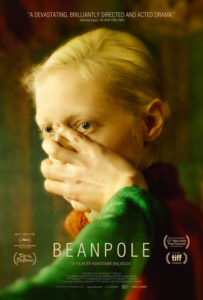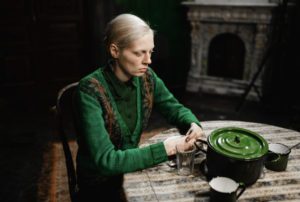Film Review: “Beanpole” Sprouts a Beautiful, Mournful Elegy
Written by: Christopher Llewellyn Reed | February 13th, 2020

Beanpole (Kantemir Balagov, 2019) 4 out of 4 stars.
The Great Patriotic War, as Russians call World War II, claimed the lives of approximately 26 million Soviet citizens. The nearly 900-day-long siege of Leningrad, in which the Nazis blockaded the city to prevent supplies from entering, caused the death of over 1 million people, alone. As traumatic as the war might seem to Americans, who certainly paid a price in their lost children, the horrors of armed conflict and resultant starvation and disease happened far away. We humans are a brutal species, prone to visiting destruction on our neighbor. At least our base nature provides an endless supply of dramatic narratives, however. In Beanpole, Russian director Kantemir Balagov (Closeness) explores bloodshed and its catastrophic aftermath through the eyes of survivors whose damaged lives speak to the bleak consequences of post-apocalyptic existence. The world may be moving on, however fitfully. Can they?
Actresses Viktoria Miroshnichenko and Vasilisa Perelygina, both making their debuts, star as Iya and Masha, two close friends who met in the army and now reunite upon Masha’s return. It’s 1946, and the city is still short on food and medicine, though the hospital where Iya works as a nurse does its best to care for its wounded veterans. Iya’s boss, the head doctor, takes an especial interest in not only her, but her infant son, providing them with extra rations after the death of a patient. That son (the father is absent, most likely dead) is the center of Iya’s focus, though when Masha arrives, we discover that Iya may have even stronger feelings for her, their bond seemingly beyond merely that of those who served together.

Iya, herself, is quite childlike, despite her great height – she’s the “beanpole” of the title – her occasional helplessness made more severe by recurring symptoms from a concussion that appears to have caused lasting damage. When we first meet her, in the opener, she’s frozen in place, sounds muffled around her, barely audible croaks and squeaks emanating from her throat. Eventually, her paralysis ends, the noise around her returning around her, and with a smile on her face she goes about her business. Unfortunately, this is not the last time she will succumb to her injury, to dire results. Balagov has a profound story to tell, though not a happy one.
For Masha is damaged, too, and though she seems the more functional of the pair, has her own mental and physical anguishes to work through. So, too, do most of the ancillary characters, though Balagov also examines the way class and privilege, even in a communist society, allowed some to do better than others during the war. Mostly, though, in scene after anguished scene, he allows his magnificent performers to portray the severe difficulties of overcoming catastrophe. Miroshnichenko and Perelygina are marvelous to behold, separately and together, revealing, via subtle gestures and behaviors, their slowly evolving states. The future may be bleak, but it is less so because of the joy of watching their mournful pas de deux. Art is beautiful, even when sad.



